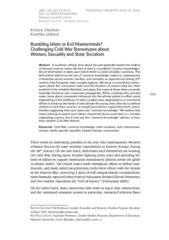Bumbling Idiots or Evil Masterminds? Challenging Cold War Stereotypes about Women, Sexuality and State Socialism
Nespretni idioti ili zli planeri? Propitivanje hladnoratovskih stereotipa o ženama, seksualnosti i državnom socijalizmu
Чланак у часопису (Објављена верзија)
Метаподаци
Приказ свих података о документуАпстракт
In academic writing, facts about the past generally require the citation
of relevant sources unless the fact or idea is considered “common knowledge:”
bits of information or dates upon which there is a wide scholarly consensus. This
brief article reflects on the use of “common knowledge” claims in contemporary
scholarship about women, families, and sexuality as experienced during 20th
century, East European, state socialist regimes. We focus on several key stereotypes
about the communist state and the situation of women that are often
asserted in the scholarly literature, and argue that many of these ideas uncannily
resemble American anti-communist propaganda. When contemporary scholars
make claims about communist intrusions into the private sphere to effect social
engineering or the inefficacy of state socialist mass organizations or communist
efforts to break up the family or indoctrinate the young, they often do so without
citation to previous sources or empirical eviden...ce supporting their claims,
thereby suggesting that such claims are “common knowledge.” We believe that
those wishing to assert such claims should link these assertions to concrete
originating sources, lest it turn out the “common knowledge” derives, in fact,
from western Cold War rhetoric.
Кључне речи:
Cold War / common knowledge / state socialism / anti-communism / women / family / gender / sexuality / Eastern Europe / communismИзвор:
Filozofija i društvo/Philosophy and Society, 2016, 27, 3, 489-503Издавач:
- Beograd : Institut za filozofiju i društvenu teoriju
Институција/група
IFDTTY - JOUR AU - Ghodsee, Kristen AU - Lišková, Kateřina PY - 2016 UR - http://rifdt.instifdt.bg.ac.rs/123456789/1865 AB - In academic writing, facts about the past generally require the citation of relevant sources unless the fact or idea is considered “common knowledge:” bits of information or dates upon which there is a wide scholarly consensus. This brief article reflects on the use of “common knowledge” claims in contemporary scholarship about women, families, and sexuality as experienced during 20th century, East European, state socialist regimes. We focus on several key stereotypes about the communist state and the situation of women that are often asserted in the scholarly literature, and argue that many of these ideas uncannily resemble American anti-communist propaganda. When contemporary scholars make claims about communist intrusions into the private sphere to effect social engineering or the inefficacy of state socialist mass organizations or communist efforts to break up the family or indoctrinate the young, they often do so without citation to previous sources or empirical evidence supporting their claims, thereby suggesting that such claims are “common knowledge.” We believe that those wishing to assert such claims should link these assertions to concrete originating sources, lest it turn out the “common knowledge” derives, in fact, from western Cold War rhetoric. PB - Beograd : Institut za filozofiju i društvenu teoriju T2 - Filozofija i društvo/Philosophy and Society T1 - Bumbling Idiots or Evil Masterminds? Challenging Cold War Stereotypes about Women, Sexuality and State Socialism T1 - Nespretni idioti ili zli planeri? Propitivanje hladnoratovskih stereotipa o ženama, seksualnosti i državnom socijalizmu IS - 3 VL - 27 SP - 489 EP - 503 DO - 10.2298/FID1603489G ER -
@article{
author = "Ghodsee, Kristen and Lišková, Kateřina",
year = "2016",
abstract = "In academic writing, facts about the past generally require the citation
of relevant sources unless the fact or idea is considered “common knowledge:”
bits of information or dates upon which there is a wide scholarly consensus. This
brief article reflects on the use of “common knowledge” claims in contemporary
scholarship about women, families, and sexuality as experienced during 20th
century, East European, state socialist regimes. We focus on several key stereotypes
about the communist state and the situation of women that are often
asserted in the scholarly literature, and argue that many of these ideas uncannily
resemble American anti-communist propaganda. When contemporary scholars
make claims about communist intrusions into the private sphere to effect social
engineering or the inefficacy of state socialist mass organizations or communist
efforts to break up the family or indoctrinate the young, they often do so without
citation to previous sources or empirical evidence supporting their claims,
thereby suggesting that such claims are “common knowledge.” We believe that
those wishing to assert such claims should link these assertions to concrete
originating sources, lest it turn out the “common knowledge” derives, in fact,
from western Cold War rhetoric.",
publisher = "Beograd : Institut za filozofiju i društvenu teoriju",
journal = "Filozofija i društvo/Philosophy and Society",
title = "Bumbling Idiots or Evil Masterminds? Challenging Cold War Stereotypes about Women, Sexuality and State Socialism, Nespretni idioti ili zli planeri? Propitivanje hladnoratovskih stereotipa o ženama, seksualnosti i državnom socijalizmu",
number = "3",
volume = "27",
pages = "489-503",
doi = "10.2298/FID1603489G"
}
Ghodsee, K.,& Lišková, K.. (2016). Bumbling Idiots or Evil Masterminds? Challenging Cold War Stereotypes about Women, Sexuality and State Socialism. in Filozofija i društvo/Philosophy and Society Beograd : Institut za filozofiju i društvenu teoriju., 27(3), 489-503. https://doi.org/10.2298/FID1603489G
Ghodsee K, Lišková K. Bumbling Idiots or Evil Masterminds? Challenging Cold War Stereotypes about Women, Sexuality and State Socialism. in Filozofija i društvo/Philosophy and Society. 2016;27(3):489-503. doi:10.2298/FID1603489G .
Ghodsee, Kristen, Lišková, Kateřina, "Bumbling Idiots or Evil Masterminds? Challenging Cold War Stereotypes about Women, Sexuality and State Socialism" in Filozofija i društvo/Philosophy and Society, 27, no. 3 (2016):489-503, https://doi.org/10.2298/FID1603489G . .


